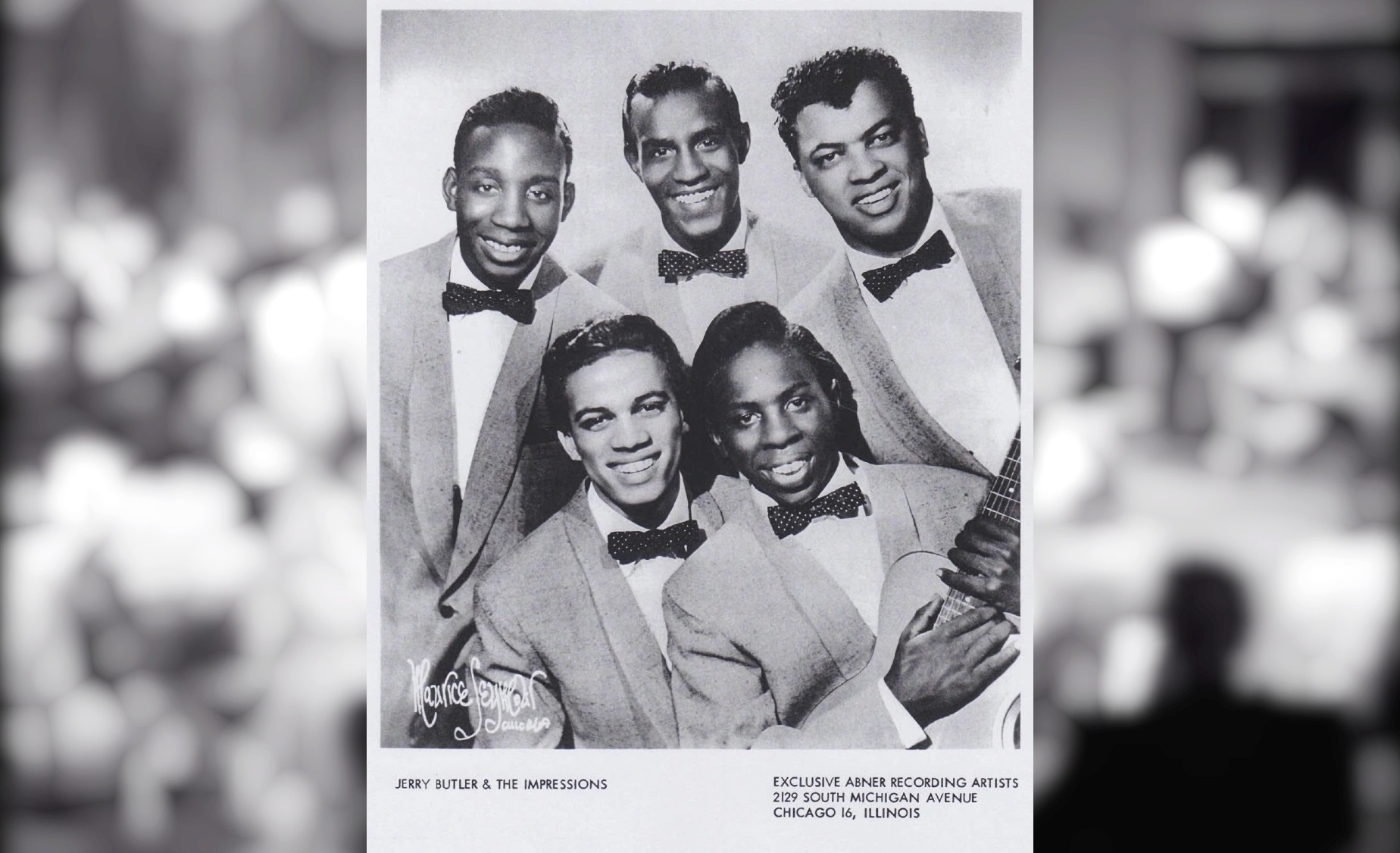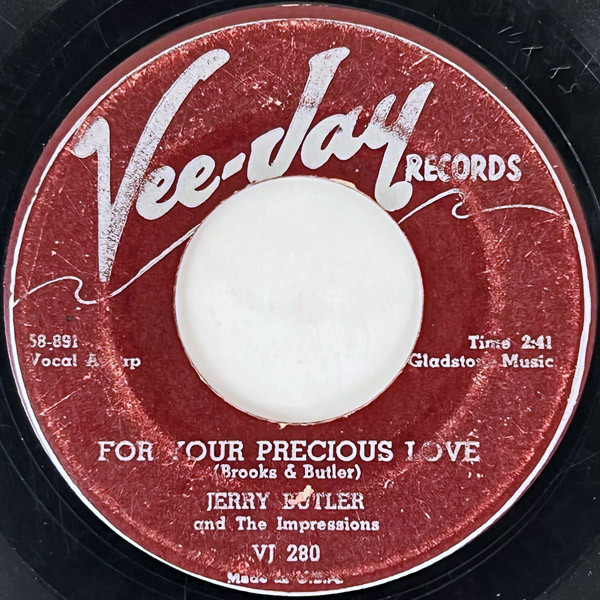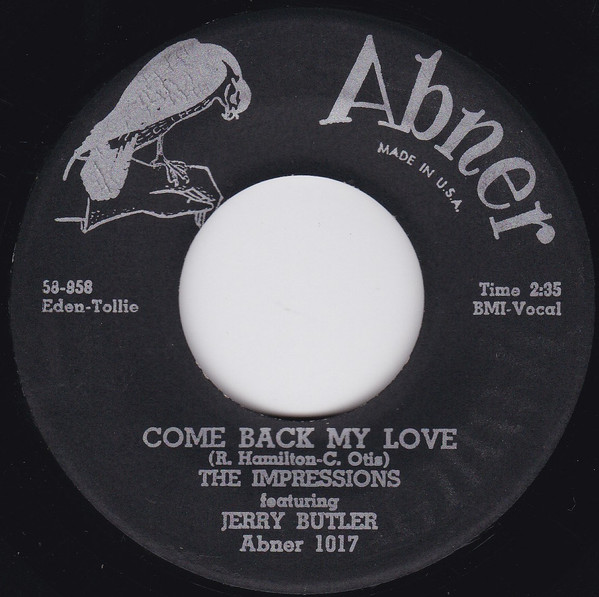
By Scott Shea
There’s a great little reissue company out of England called Beat Goes On Records that specializes in multiple album reissues in one or two CD sets. I’m not sure whether they source from masters or high-quality vinyl, but their reissues are pristine. They’re getting ready to release a quartet of late-1960s Jerry Butler Mercury albums, which is like ear candy to soul music aficionados. It got me thinking about the legendary singer, who’s criminally underrated in my humble opinions, and his roots with Curtis Mayfield & the Impressions. For a doo wop nut like me, a successful soul group filled with incredibly talented singers and musicians that started off singing harmony is like gold at the end of a rainbow, or, maybe in this case, at the start of the it. In the late 1960s, Butler was in the middle of a successful solo career that began not long after parting ways with the original Impressions in 1958. He quickly became one of Vee Jay Records top acts with his warm baritone gracing beautifully crafted songs like “He Will Break Your Heart,” “Moon River” and “Make It Easy on Yourself.” By the time he signed with Mercury in 1967, after charting close to 10 Top 40 hits on the Billboard Top 40 and 15 on the R&B, he was in the middle of a dry spell, but it wouldn’t last very long. His time at Mercury launched a career resurgence after partnering with the Philadelphia-based songwriting/producing team of Kenny Gamble and Leon Huff. He returned to his hitmaking ways with hits like “Never Give You Up,” “Only the Strong Survive” and “Hey, Western Union Man,” which cemented his status as a legend. But what about that time with the Impressions? Why was it so short and why did he leave?
There’s an exclusive club in the pinnacle of popular music that consists of artists who left a band either before or at the very start of their success and, subsequently, both they and the band they left went on to become superstars. Jerry Butler & the Impressions are among those. Other similar scenarios from that era include the Tokens, who counted Neil Sedaka as a co-founder and original lead vocalist, and the Yardbirds who featured Eric Clapton as their lead guitarist when they signed to Columbia in 1964. In subsequent decades and musical genres, original Genesis lead singer Peter Gabriel left before he and they became international superstars and Megadeth founder Dave Mustaine was an original member of Metallica before getting the boot in April 1983. Though Jerry only lasted less than a year and three singles with the Impressions, he helped get them started in a big way with their first hit, “For Your Precious Love” in the summer of 1958, which started out as a poem he wrote in high school entitled “They Say.”
Traveling Souls
The Impressions first got together in the Cabrini-Green projects of Chicago as a vocal quintet called the Roosters in September 1957. Jerry, fresh out of high school and a short order cook, hooked up with three strangers from Chattanooga, Tennessee: brothers Richard and Arthur Brooks and Sam Gooden. The harmony was raw, but there was something there, so he brought in friend Curtis Mayfield, four years his junior and already an incredible guitarist, to tighten them up. Both grew up in the Chicago ghettos along the southwestern shore of Lake Michigan in varying degrees of poverty and met at Curtis’ grandmother’s Traveling Souls Spiritualist Church over on the West Side where they sang together in her Northern Jubilee Gospel Choir. Jerry’s family immigrated to Cabrini-Green from Sunflower, Mississippi when he was three as refugees from the stifling Jim Crow laws, which oppressed black Southerners socially and politically following Reconstruction in the late-19th century. Curtis was a Chicago native who grew up fatherless and in abject poverty in the decaying White Eagle Hotel on the South Side and moved north to Cabrini-Green around the time he entered high school.
Jerry and Curtis first met about five years earlier when Jerry joined Rev. Mayfield’s church choir. He was looking to expand his singing and found his way there through a friend. Even at age 13, Jerry’s voice had developed into a rich, smooth baritone and the young singer cut his teeth singing spirituals like “I’ll Fly Away” and “I Am a Pilgrim” at her Sunday services. He must’ve seemed like a grown man to nine-year-old Curtis, but it didn’t stop him from attempting to sing with him.
“We used to kick Curtis to the side because…he was the little guy,” Jerry told NPR’s Terry Gross in a 2001 interview. “We kind of kept shoving him to the back until he learned how to play the guitar and then he kind of just took over.”
The Brooks brothers and Sam had gained some degree of notoriety singing around Chattanooga as Four Roosters and a Chick, but they decided that, if they were ever going to score a record deal, they needed to go to Chicago. It was closer than New York or L.A., but just as productive. The chick ended up getting married and the other Rooster couldn’t get his parents’ permission, so they headed north as a trio in late summer 1957.
When Jerry graduated high school in June 1957, he arrived at those old familiar crossroads and had no idea where to go or what to do. He’d found his footing in high school studying culinary arts and was considering pursuing that further but wasn’t very committed. He wanted to sing and felt the urge to follow that path. Another friend who knew of his ambition led him to a basement flat a few blocks north on Larrabee Street one September evening where he met the Roosters. They were dead set on making a record and impressed Jerry enough to convince him to regularly join them in rehearsals, but he recognized that they needed a little musical direction. None of them were musicians in the traditional sense, so Jerry called upon his old Northern Jubilee Gospel Singers bandmate, Curtis Mayfield, who was playing with another group called the Alphatones. Over the last several years, he’d become a solid guitarist and Jerry felt uniting with him could produce fruit.
Convincing Curtis wasn’t easy though. He liked what he had going with the Alphatones and wanted to stick with them, but Jerry talked him into splitting his time and hedging his bets.
“You rehearse three nights a week with us and three nights a week with your group,” he told Curtis. “Whoever improves first, or seems to have the most potential, will be the group you go with.”
It made sense. It was going to be a little extra work, but Curtis loved playing music, so he agreed, and it didn’t take long for him to realize that the Roosters were the better option. Like Jerry had hoped, Curtis helped them improve and they quickly began playing around town at house parties, street carnivals and even in between the sets of jazz legends Sonny Stitt and Gene Ammons at the C&C Lounge. At a talent show at Washburne Vocational High School in Cabrini-Green, where they performed Sam Cooke’s recent hit, “You Send Me,” they caught the attention of local promoter Eddie Thomas. He was managing another group in the show, the Medallionaires, led by the talented Willie Wright. He was impressed, but they made the first move, asking him to be their manager. Eddie was sold but remained coy and quietly sold them on him with a trip around the city in his yellow Cadillac to several night clubs where he glad-handed and schmoozed with club owners and maître d’s. He agreed to take the Roosters on but told them the name had to go. It was too country. Jerry and Curtis couldn’t have been happier. Every time they were announced at a gig, jokers in the audience would cluck and crow throughout their set. He dubbed them the much hipper sounding “Impressions,” which perhaps gave Jerry, a poetry and art lover, images of Monet and Degas, but had more to do with the good feeling they wanted to give their audiences.

First Impressions
Eddie’s mission was to get this group signed to a record label immediately. After rejections from Savoy and King, Eddie approached Mercury Records A&R man Don Costa. It was Chicago’s biggest label and headquartered there since its inception in 1945. Although he was suitably impressed with what he’d heard, Costa said his roster was too full and offered them session work instead. Vee Jay was the next best option. It was a fairly new operation that had been cranking out cutting edge Chicago blues, R&B and doo wop since the summer of 1953 by artists like Jimmy Reed, the Spaniels, the El Dorados and John Lee Hooker under the auspices of 35-year-old co-owner Ewart Abner. Eddie secured the audition through Vi Muszynski, owner of the brand-new Vee Jay subsidiary Bandera Records, who had considerable ties with principal owners Vivian Carter and her husband, James Bracken. Through the relative warmth of an early April morning in 1958, the five youngsters traipsed their way 10 miles north to Vee Jay’s rehearsal space on the corner of 47th Street and South Park Way to audition for A&R man Calvin Carter, Vivian’s brother and producer of many hit records. The Impressions were understandably nervous, but got themselves together, singing a few hokey countryish songs provided by Vi. She did, after all, name her label after Slim Whitman’s “Bandera Waltz.” Calvin liked their harmony but couldn’t get behind anything they were singing.
He asked if they had any original songs, which they did, but none of those moved him either. It seemed like it was bound to be yet another failed audition, but, as they were packing up, the shrewd producer gave it one more shot.
“Sing something you’re ashamed to sing,” Calvin told them. “Sing something you don’t usually feel like singing in public.”
That meant Jerry’s poem that they set to music called “For Your Precious Love.” Curtis pulled out his guitar, which he kept tuned in an open F#, and what followed made the hair on the back of Calvin’s neck stand up. Inspired by the Gospel Clefs “Open Our Eyes,” one of the hottest gospel hymns in the nation, and set to a sophisticated 6/8-time signature, “For Your Precious Love” breathed into the ether like incense, overwhelming the producer with its sweet half-doo wop, half-gospel accords. Curtis Mayfield’s falsetto floated over the Brooks brothers and Sam’s heavenly harmonies like a dove and its poetic elements made the song different from anything Calvin had heard in a subgenre he’d helped to pioneer. There was no chorus, no repeated lines and no doo wop, shh-bops; only Jerry’s aching baritone in the middle of all this sonic beauty, pining away for a lost love. There was nothing very doo wop about it and yet it somehow seemed to encapsulate all its beauty.
“That’s it! That’s it! That’s the one,” Calvin exclaimed.
The Impressions were shocked that this was the one that won him over. From there, everything moved so quickly. Calvin yelled for Vi to go get Abner and draw up a contract and soon, those two and Eddie began hashing out a deal. The boys could hardly wrap their heads around what was going on when, suddenly, the Spaniels, stars of the label and singers of monster hits “Baby It’s You” and “Goodnite, Sweetheart, Goodnite,” walked through the door. When Calvin noticed them and called them over, their emotions plummeted in another direction.
“Hey y’all!” Calvin yelled at the Impressions, “Sing that ‘Precious Love’ song again!”
Rumors abounded of Vee Jay and other big labels hiding tape recorders all around their studios to record quality songs offered by nobodies looking for their big break and giving them to their stars instead. The five singers looked at one another incredulously but had to comply and wowed the doo wop veterans with their delicate harmony. And, as it is with most urban legends, their fears were completely unfounded. The Spaniels congratulated them on their song and signing with the label but had no interest in it. Instead, they told the youngsters what to expect following success and wished them well. One crisis was averted, but a new one lay just around the corner.
Second Fiddle Syndrome
As impressive as the Impressions were, they were relegated to the subsidiary Falcon label, which had a dozen releases in its short history and nothing substantial. As the records were being pressed, a box of promos and giveaways were shipped to Vee Jay’s headquarters on South Michigan Avenue and the Impressions beat feet down there as soon as they heard. For Calvin, Abner and Vi, it was just another day at work, but for the five youngsters and their manager, it was like all their Christmases coming at once. But when they opened the box and began passing out the 45s, it may as well have been a lump of coal. Underneath the song title on both sides of the disc read “JERRY BUTLER” in big bold text and underneath, in much smaller letters, “and the Impressions.” It was a gut punch to the other four and a source of embarrassment to Jerry. The initial shock and disbelief gave way to an uncomfortable silence that lingered until Jerry spoke up.
“You’ll have to reprint the label so that it reads ‘The Impressions,’” he offered to Abner in front of his stunned friends. “If you don’t, we’re going to have dissension in the group before we ever get started.”
Arthur and Sam nodded in agreement while Curtis and Richard still gazed disbelievingly at the record. Abner had been through this before, telling the greenhorns that this is a showbusiness commonality and that they’ll make more money touring because of it. He wasn’t lying. At many venues, whenever a singer attached with a group performed, both the leader and the group got paid separately and split the money evenly, but it often resulted in discord and greed. It’s what caused Motown founder Berry Gordy to separate Martha Reeves from the Vandellas, Diana Ross from the Supremes and Smokey Robinson from the Miracles nearly a decade later. Seeing that this approach wasn’t working with the boys, Abner got down to brass tacks and gave them the financial facts of life. Reprinting labels to sooth the egos of a bunch of nobodies would sink the record and was out of the question. He went on to say that this would give them more airplay and that they should trust him and the people at the label in matters of promotion and publicity. His tenacity played on their emotions and got them feeling downright sheepish for raising an objection in the first place.
“For Your Precious Love” soared after its release and peaked at #11 on the pop charts and #3 on the R&B in July. The label sprung for new suits and the quintet headed out on several promotional tour, playing coast to coast and hitting historic venues like the Apollo in NYC, the Palms in Miami and the Uptown in Philadelphia. It’s conceivable that the success and touring would’ve brought them closer, but the damage from the record label was irreparable. The other four got sore almost every time they went to a venue that had “Jerry Butler & the Impressions” on the marquee, or, in some cases, just “Jerry Butler.” To make things worse, manager Eddie Thomas was forced to leave to serve a short prison sentence for a postal crime committed in his previous life and couldn’t be there to ease tensions. The Brooks brothers took it worst of all and, in one instance, threatened to not go on stage at a gig in San Antonio in August 1958 after Jerry got off the phone with Abner without letting Arthur speak to him. He accused Jerry of always acting like the boss and told him that he could go out and sing on his own. Sam initially broke ranks and sided with the two brothers, but changed his mind after Curtis said he was going on stage with Jerry because he wanted to get paid. It must’ve given Jerry some comfort to know that his old friend chose to stand by him, but it didn’t do anything to heal the fissure. After the show, Jerry decided to leave the group and gave his final performance at a tour closer at the Magnolia Ballroom in Atlanta on October 22nd.

During his brief 16 months with the group he co-founded, the Impressions released three singles and had no other hits following “For Your Precious Love.” His departure didn’t do much to ease the tension and power struggles within the group. Curtis was given the opportunity to accompany Jerry and be his arranger and touring band leader, which he seriously considered but ultimately decided to forego to continue recording with the Impressions for Vee Jay, which caused the relationship between the two former Northern Jubilee Gospel Singers to grow awkward. One of Curtis’ provisions to join Jerry was a contract, which shocked and saddened the upstart solo singer. To him, it was a sign of mistrust, but for Curtis, it was just simply a precautionary measure borne out of life on the road and getting ripped off by the occasional promoter not to mention Vee Jay’s tricks.
Life with the Impressions wasn’t much better for Curtis. Richard and Arthur Brooks continued to be difficult to work with and Curtis was the new target of their ire after he took over the leadership role. Former Rooster Fred Cash, who two years earlier wasn’t allowed to accompany his friends to Chicago, was brought in as the new baritone and hit it off with Curtis and Sam more than the other two. Anybody who had eyes and ears could see that Curtis was going places and was their best bet to make it in showbusiness. But the fickle reality of the entertainment business seemed to be raining down on the group and potential never pays the bills. With no further hits, Vee Jay dropped the Impressions in May 1959 and with no other label interested and show dates all dried up, they went on hiatus and slinked back to the real world. Curtis got married and took a job with the Alfred Dunhill Co. selling cigars to executives in the Chicago Loop. It seemed like his career had stalled out before it even got started and wasn’t sure what his next move should be until Jerry Butler came calling.
After The Same Rainbow’s End
When he went out as a solo singer, Jerry put a touring band together and after some trial and error, hired guitarist Phillip Upchurch whom he met through his wife, Annette. Phillip had chops, playing with fellow Chicago artists the Spaniels and the Dells, and things were going pretty good until another Chicagoan, Dee Clark, stole him away and left Jerry in a lurch. He placed a quick phone call to Curtis who was initially apprehensive. It wasn’t for a lack of interest, but more a lack of equipment. After Jerry promised him a new amplifier, he received a one-way ticket to New York and joined him on tour. When he got there, he was pleasantly surprised to find Eddie Thomas, fresh out of prison, working for Jerry as a valet and the three got along famously.
Any remaining Impressions tension that existed between Jerry and Curtis had melted away with time, but the dichotomy between their personalities was still drastic. Jerry was tall and athletic, debonair and disarming and his good looks matched his magnificent baritone, which had become more powerful and effective with experience and proper training. By contrast, Curtis was introverted and shy. His awkward looks and meekness, magnified by his self-consciousness about his dark skin and large front teeth, betrayed his incredible talent and drive. Neither could’ve predicted that this reunion would lift both up to unimaginable heights.
And it proved fruitful right off the bat. On a drive from Philadelphia to Atlantic City, Jerry started humming a melody that Curtis started strumming along to on his guitar in the backseat. He always kept it handy, constantly picking at it and coming up with melodies and song sketches. The song they put together became “He Will Break Your Heart,” Jerry’s breakthrough solo hit that hit #7 on the pop charts and #1 on the R&B and Curtis’ fingerprint is everywhere. His guitar features prominently in the arrangement and his background vocal is so prominent that it almost seems like a duet. Jerry followed that hit up with two more from the pen of Curtis Mayfield, “Find Another Girl” and “I’m a Telling You.” Both hit the Top 30 on the Pop and the Top 10 on the R&B. Now that they were on a roll, Curtis dove headfirst into being Jerry’s arranger on stage and in studio and contributed greatly to his next big hit, “Moon River.”
It was the theme to the forthcoming Blake Edwards film, “Breakfast at Tiffany’s,” starring Audrey Hepburn and George Peppard. The haunting melody, composed by Henry Mancini, played throughout the film, but the version with lyrics, written by the inimitable Johnny Mercer, only appeared once. It was sung by Hepburn while strumming an acoustic guitar on a fire escape as a curious Peppard watched from the egress above. Mancini released the instrumental version to coincide with the film’s release in October 1961, but the publisher was having trouble finding a notable singer to tackle the song with bizarre lyrics. Calvin Carter, who gave the Impressions their big break, insisted that Jerry sing it, and, in the hands of Jerry and Curtis “Moon River” became fashioned for contemporary ears. In the studio, they changed it from a waltz to a moderate cha-cha rhythm with Curtis adding a Duane Eddy-styled twangy guitar to the intro that boosted it to the stratosphere and gave it the distinctive, identifiable intro required in just about every pop hit. “Moon River” peaked in the Top 15 on both the pop and R&B charts and became bigger over time. With Curtis having the magic touch, his mind started getting occupied with what he could do for himself. In the year that he and Jerry worked together, his simple, rhythmic arrangements and uniquely original songs broke up the monotony and generality of Jerry’s solo releases and distinguished him from every other new artist hoping for a break. It was time to take this in a different direction.
Keep On Pushing
Carrying on in the role of Jerry’s arranger, Curtis continued to write for the idle Impressions and carried the secret hope of getting them back together. His focus for the moment was the fairy tales and ancient stories his mother used to read to him and his siblings before bed in their pitiful little apartment in the White Eagle Hotel. Songs like “Minstrel and Queen,” “Sad, Sad Girl and Boy,” and two standouts, “Isle of Sirens” and “Gypsy Woman” came during this period and helped developed young Curtis as a writer. “Isle of Sirens,” with its haunting melody and compelling story was given to Jerry and turned into his 11th Vee Jay single. Though it didn’t chart, Curtis’ future Impressions sound was all over it; from his unique F# tuning to incredible lyrics, inspired by the mystical island of murderous temptresses featured in Homer’s “The Odyssey,” to its wild twist ending. “Gypsy Woman” was his ace in the hole though and, with a little luck, perhaps his ticket out of being a sideman.
Once Curtis got “Gypsy Woman” together, he wasted no time pitching it to anyone else with influence who’d listen. Everybody he sang it to loved it, but, without a record deal, there wasn’t much anyone could do. That’s when Eddie Thomas stepped back into the picture. Being in the role of Jerry’s flunky did nothing to stifle his ambition and he encouraged Curtis to reunite the Impressions and make this their comeback hit. On a tour stop in Chicago, Curtis reunited the four other Impressions and played the song for them and, of course, they loved it and brimmed with excitement at the prospect of getting back into the music game. Curtis had saved around $1,000 from touring with Jerry and booked a session at Universal Recording Studio where Roy Glover oversaw the recording. With a demonstration record ready to go, Eddie Thomas got to work. After getting rejected by all the majors in Chicago, he hit the streets in New York City when Jerry’s touring schedule brought him to the Apollo in April 1961. He was rejected by Laurie, Scepter and RCA Victor before meeting with ABC-Paramount A&R rep Clarence Avant. The 30-year-old black music executive wasn’t entirely bowled over by the song, but he felt a kinship with Eddie and the Impressions and went to bat for them.
The song was bold. Doo-wop was still riding high in 1961 and, although “Gypsy Woman” contained many of its hallmarks, it pushed the limits with its unique subject matter of a nomad being tempted by an exotic dancer, a la King Herod and Salome from the Gospels of Matthew and Mark, augmented by castanets, dark minor chords and flamenco rhythm. Avant was able to get label head Samuel Clark to give them a small deal, but it came with no advance and would receive little promotion. The Impressions were fine with those provisions. If the song broke, it meant they’d get royalty money faster and they had a secret weapon in Eddie Thomas who was on a first-name basis with dozens of DJs across the country. Not only that, but Curtis had already performed the song for big movers and shakers like WHAT DJ Georgie Woods in Philadelphia. Once he got to playing it after its August release, it spread like wildfire to prominent jocks like “Fat Daddy” Johnson at WSID in Baltimore, Bill Summers at WLOU in Louisville and Porky Chedwick at WAMO in Pittsburgh. By mid-October, it entered the Hot 100 and peaked at #20 around Christmas, leading Curtis to wrap up his time with Jerry Butler and devote all his focus to developing and touring with the Impressions.
The Strong Survive
As the decade wore on, both Jerry and his former band ascended to the top of crossover R&B artists, amassing a combined total of 24 Top 40 hits and a staggering 47 on the R&B. Curtis Mayfield, who wrote the lion’s share of the Impressions material, gently brought the Civil Rights Movement into the charts, first with nod and wink in songs like “It’s All Right,” “Keep on Pushing” and “I’m So Proud before going more overt with songs like “We’re a Winner,” “This is My Country” and “Choice of Colors,” which lent compassion and reason to a tumultuous time of racial and political strife. Before parting with Jerry, he, along with Eddie Thomas, formed Curtom Publishing with Jerry acting as a silent partner. They also purchased Dinah Washington’s Queen Booking Agency following her death in December 1963, but eventually abandoned it when it got overrun by organized crime. With the former, Curtis fashioned himself into a mini music mogul, writing and producing original hits for artists like Major Lance, Gene Chandler, the Five Stairsteps and others and even turned Curtom into a label in 1968. His producing skills carried over into the 1970s with R&B heavyweights Aretha Franklin, the Staple Singers and Gladys Knight & the Pips.
Jerry’s approach to music and culture was more intangible and emanated more as the picture of cool sophistication and confidence, especially when he united with the powerhouse Philadelphia songwriting/production team of Kenny Gamble and Leon Huff. After going through a mid-60s lull as Vee Jay slowly went bankrupt, Gamble and Huff reinvigorated his career in 1968, beginning with hits like “Never Give You Up,” “Hey, Western Union Man” and “Only the Strong Survive,” which Jerry co-wrote based on a conversation he had with his mother after breaking up with a girl as a teenager. This union served up some refined funk that was as savory as the two prominent steak shops at that funny intersection of East Passayunk Avenue and Wharton Street on the edge of South Philly. His run on the pop Top 40 ended in 1971 but continued to chart on the R&B through the late-1970s. His last album came out in 1982, after which he hung up his recording career and put his civil rights into action by becoming an elected official. After winning election to the Cook County Board of Commissioners in 1986, he won reelection every time until finally retiring from public life 2018.
But it was Curtis Mayfield who became the icon of the former quintet. Richard and Arthur Brooks left after he took full command of the group in 1963 and disappeared into obscurity. Curtis left the Impressions in 1970 and went on to carve out an incredible solo career, releasing cutting edge soul and funk records and redefining the motion picture soundtrack game for the blaxploitation films “Super Fly,” “Claudine,” “Let’s Do It Again” and “Sparkle.” The former is his most enduring with the Grammy-nominated “Freddie’s Dead” and the title track becoming genre-defining anthems that influenced hip hop sampling a decade later and is still heard all over the radio and in movie soundtracks. Even with all his success, he never forgot his roots and reunited with Jerry Butler and the Impressions a handful of times over the remainder of his career. The first was on his 1973 live LP, “Curtis in Chicago,” where he, Jerry, Sam and Fred sing together on “For Your Precious Love” and then again on a 1983 reunion tour that did not feature the Brooks brothers. Unfortunately, it would be the final time the Impressions ever toured together. As it seems to be the case with so many musical geniuses, tragedy struck Curtis Mayfield down on August 13, 1990, when stage lighting fell on him after being introduced at an outdoor concert in Brookyln, New York, making him a quadriplegic.
The reunion of all five original members of the Impressions, as well as those who followed, should’ve occurred in 1991 when they were inducted into the Rock and Roll Hall of Fame, but Curtis was unable to attend because of continuing health issues following the accident. It cast a pall on what should’ve been a happy occasion, which was further marred by a growing rift between Sam Gooden and Fred Cash and Arthur and Richard Brooks. The brothers had toured for several years as the “Original Impressions,” which annoyed Sam and Fred greatly. Jerry Butler did his best to play peacemaker, but his lingering memories of that night are of disappointment. A happier reunion took place three years later when the Grammys honored Curtis with its Legend Award. He took the stage in his wheelchair with Jerry, Sam and Fred at his side and the four of them signed off singing a chorus of “Amen.” It was the last time Curtis Mayfield ever sang in public. On March 15, 1999, he was inducted into the Rock and Roll Hall of Fame as a solo artists and nine months and eleven days later, died from complications brought about by type 2 diabetes. He was 57.
It was a humble way to die for someone who contributed so much not only to our culture musically and socially, but matched his seemingly meek disposition which betrayed his lion’s heart. As of this writing, Jerry Butler is the only living original Impression, but his replacement, Fred Cash, is still alive and well in Chattanooga, Tennessee. Arthur Brooks passed away in 2015 followed by Sam Gooden in 2022 and Richard Brooks a year later.
Like so many black artists of their era, Jerry Butler & the Impressions faced insurmountable odds to get to the top of the music business, and they not only made it in a big way but used their voice to make the world a better place and influence others for good. And there weren’t too many smarter than Jerry Butler and Curtis Mayfield who first set the tone with exquisite harmony before asking better of their fellow man. For music soothes the savage beast and it’s hard to argue with a beautiful melody even though you can’t please all of the people all of the time. It’s an incredibly effective approach that doesn’t seem to be used much these days by anyone for anything. Jerry and Curtis may have grown up cold, poor and deprived in the projects of Chicago, but the music they gave the world showed some of the love and beauty that existed within each sidewalk crack and behind many a tenement window in Cabrini-Green.





Thank you for this article. Quite a story! I was born in 1958 and didn’t pay attention to Curtis Mayfield and the Impressions until the early 70s. My brother (10 yrs older) told me they went back a ways and Jerry Butler had been a part of The Impressions. Your article explained all that for me many years later. Its sad when egos spoil what could be magnificent.
Thanks again.